Aquaculture Europe 2014
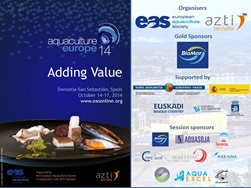 The European Aquaculture Society (EAS) organised this year’s Aquaculture Europe 2014 conference held in Donostia-San Sebastián, Spain from October 14th to 17th. This interesting conference, themed Adding Value featured a series of contributions from the PRO-EEL project. Again this year, a dedicated session on eel research was arranged and chaired by Jonna Tomkiewicz, DTU, Denmark and Elin Kjørsvik, NTNU, Norway. The session comprised seven interesting talks on eel research and additionally two short oral presentations of posters. Besides this, a session themed: Biology of aquatic species gametes addressing the COST action AQUAGAMETE was chaired by PRO-EEL participant Juan Asturiano, ICTA, Valencia, Spain, and featured three oral presentations related to eel research in PRO-EEL. Five poster presentations related to PRO-EEL was presented at the conference of which the poster: Maternal mRNA expression in European eel eggs and embryos and its relationship to offspring developmental competence, by Christoffer Rozenfeld won the EAS Best Student Poster Award. See the conference programme here and the conference summary report here including on page 42 the Eel related summary.
The European Aquaculture Society (EAS) organised this year’s Aquaculture Europe 2014 conference held in Donostia-San Sebastián, Spain from October 14th to 17th. This interesting conference, themed Adding Value featured a series of contributions from the PRO-EEL project. Again this year, a dedicated session on eel research was arranged and chaired by Jonna Tomkiewicz, DTU, Denmark and Elin Kjørsvik, NTNU, Norway. The session comprised seven interesting talks on eel research and additionally two short oral presentations of posters. Besides this, a session themed: Biology of aquatic species gametes addressing the COST action AQUAGAMETE was chaired by PRO-EEL participant Juan Asturiano, ICTA, Valencia, Spain, and featured three oral presentations related to eel research in PRO-EEL. Five poster presentations related to PRO-EEL was presented at the conference of which the poster: Maternal mRNA expression in European eel eggs and embryos and its relationship to offspring developmental competence, by Christoffer Rozenfeld won the EAS Best Student Poster Award. See the conference programme here and the conference summary report here including on page 42 the Eel related summary.

The 3rd Eel Genome Symposium
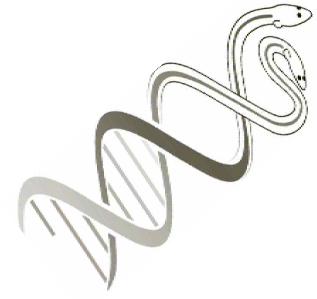
The 3
rd Eel Genome Symposium was held in Leiden, The Netherlands, on 16
th to 17
th January 2014 with the aim to form an open meeting for scientists active in the field of eel genomics, including gene expression (transcriptomes), chromosome typing, comparative genomics, endocrinology, physiology, ecology and management, aquaculture, toxicology, etc. The PRO-EEL project was represented by an array of presentations and posters by projects participants, who apply eel genome research. The Symposium was organised by Sylvie Dufour (CNRS), Guido van den Thillart (LU), and Ron Dirks (ZF-Screens). The programe and abstract book is available here:
Eel Genome Symp2014
Larvi2013 Ghent, Belgium
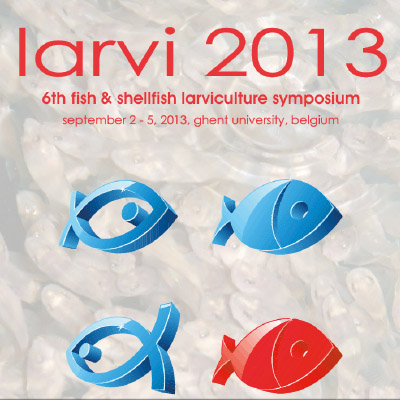
The 6th Fish and Shellfish Larviculture Symposium was held September 2nd to 5th 2013 in Ghent, Belgium, organised by the Laboratory of Aquaculture & Artemia Reference Center, Ghent University. The conference addressed larviculture challenges, considering a large variety of research fields, including broodstock management, maturation and spawning, larval development and deformities, larval nutrition, larviculture at commercial scale, and microbial management. The PRO-EEL project was represented by a talk entitled “Reproduction of European eel and larval culture: State of the art” by the coordinator Jonna Tomkiewicz, who overviewed PRO-EEL research progress with focus on captive offspring production and larvi-culture. In addition, Mathias Bouilliart captured the audience with his intriguing research on functional morphology of the feeding apparatus of European eel larvae. Additionally, posters presented PRO-EEL results at the conference. The conference provided good opportunities for discussions on larval rearing technology, including eel!
AE2013 Trondheim, Norway
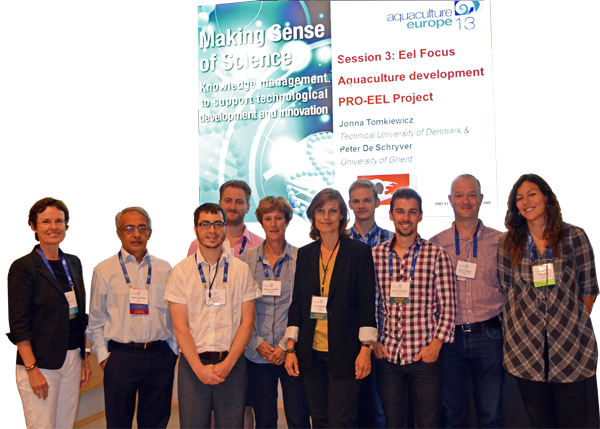
Aquaculture Europe 9-12th August 2013 organised by the European Aquaculture Society (EAS) was held at the Norwegian University of Science and Technology (NTNU) in Trondheim. The conference featured a dedicated session on eel research chaired by Jonna Tomkiewicz, DTU, Denmark and Peter De Schryver, Ghent University, Belgium. This session, hosted by PRO-EEL, focused on recent advances in captive breeding of European eel. Eight presentations and three posters covered a broad range of project results such as female fecundity, improvement of broodstock diets and egg quality, optimised fertilisation protocols, microbial interference in egg and larvae culture, rearing techniques, and new insight into the larval mouth structure and feeding capability. This recent progress in breeding technology development brought attention to eel as a potential “new species” in aquaculture.
6th World Fisheries Conference in Edinburgh 7th-11th of May 2012
An overview over PRO-EEL progress was presented by the Project Coordinator: Jonna Tomkiewicz. Progress in Japanese eel research and aquaculture was presented by Katsumi Tzukamoto, and advances in reproduction of New Zealand short-finned eel was presented by Tagried Kurwie.
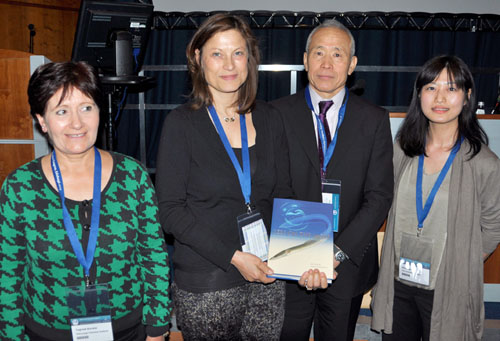
Eel researchers from different parts of the world: Tagried Kurwie (New Zealand), Jonna Tomkiewicz (Denmark), Katsumi Tsukamoto (Japan) and Mari Kuroki (Japan) contributed to the conference with presentations on captive reproduction of eel. Katsumi Tsukamoto hands over a new book on eels presenting artifacts displayed at an international exposition: "Eels and Humans" held at Tokyo University Museum in 2011.
Collaborative workshop in Valencia 27th of March 2012
The 1st PRO-EEL Collaborative Workshop was held 27th of March 2012 in Valencia, Spain, hosted by the Polytechnic University of Valencia. Almost, 100 participants joined the Workshop including eel researchers, local politicians and stakeholders as well as the PRO-EEL project officer, Stamatios Varsamos as representative of the European Commission.

The workshop aimed at communicating the state of research performed in PRO-EEL to stakeholders, scientific collaborators and networks. In addition, the status of eels in Spain was presented by national experts and three speakers represented related European research activities including the EU FP7 projects: SELFDOTT and LIFE-CYCLE as well as the COST Action: LARVINET. In total, the day offered 15 presentations and 15 posters including contributions from the PRO-EEL scientific network. Posters were displayed throughout the day and these as well as the presentations provided the basis for interesting and constructive discussions of presented results.
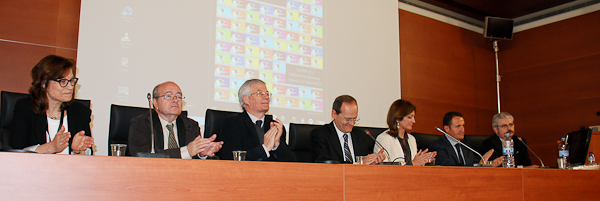
The opening session of the collaborative workshop.
The workshop was organized by the Grupo de Acuicultura Y Biodiversidad (GAB), Instituto de Ciencia y Tecnología Animal Departamento de Ciencia Animal, Universitat Politècnica de Valencia (ICTA UPV) and Institute of Aquatic Resources, Technical University of Denmark, DTU. The workshop was chaired by the local host Prof. Juan F. Asturiano, ICTA-UPV, and Dr. Jonna Tomkiewicz, DTU, coordinator of PRO-EEL.
The PRO-EEL project is supported financially by the European Commission’s 7th Framework Programme. The collaborative workshop was sponsored by Billund Aquaculture Service, BioMar and GAB.

PRO-EEL at the AE2011 conference in Rhodes 19-21th October
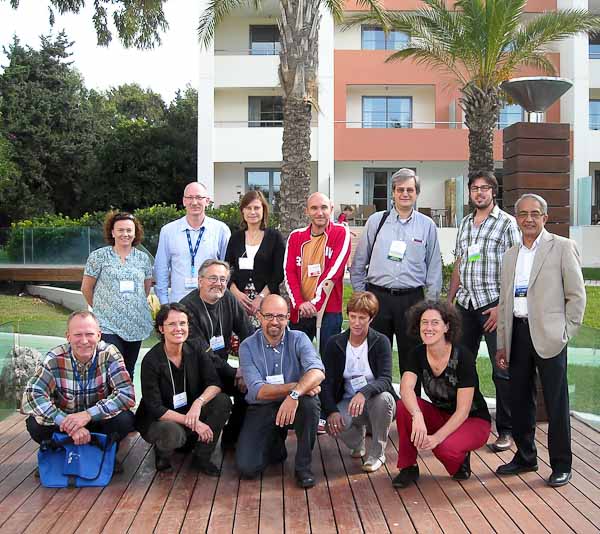 Many PRO-EEL participants joined the AE2011 conference to present results and achievements obtained during the first phase of the PRO-EEL project. The overall progress of the project was presented in a session focusing on aquaculture related research projects under the 7th Framework Programme, while task specific results targeted relevant thematic sessions (see contributions below). The PRO-EEL dissemination group met during the conference to plan future conference attendance, workshops and project meetings. The consortium used the opportunity to invite interested scientists and stakeholders to a first PRO-EEL network meeting on 21 October. The second year of PRO-EEL will stimulate the developing networks and map existing research groups working with European eel reproduction as well as stakeholders aiming at a self-sustained eel aquaculture.
Many PRO-EEL participants joined the AE2011 conference to present results and achievements obtained during the first phase of the PRO-EEL project. The overall progress of the project was presented in a session focusing on aquaculture related research projects under the 7th Framework Programme, while task specific results targeted relevant thematic sessions (see contributions below). The PRO-EEL dissemination group met during the conference to plan future conference attendance, workshops and project meetings. The consortium used the opportunity to invite interested scientists and stakeholders to a first PRO-EEL network meeting on 21 October. The second year of PRO-EEL will stimulate the developing networks and map existing research groups working with European eel reproduction as well as stakeholders aiming at a self-sustained eel aquaculture.
Aquaculture research in FP7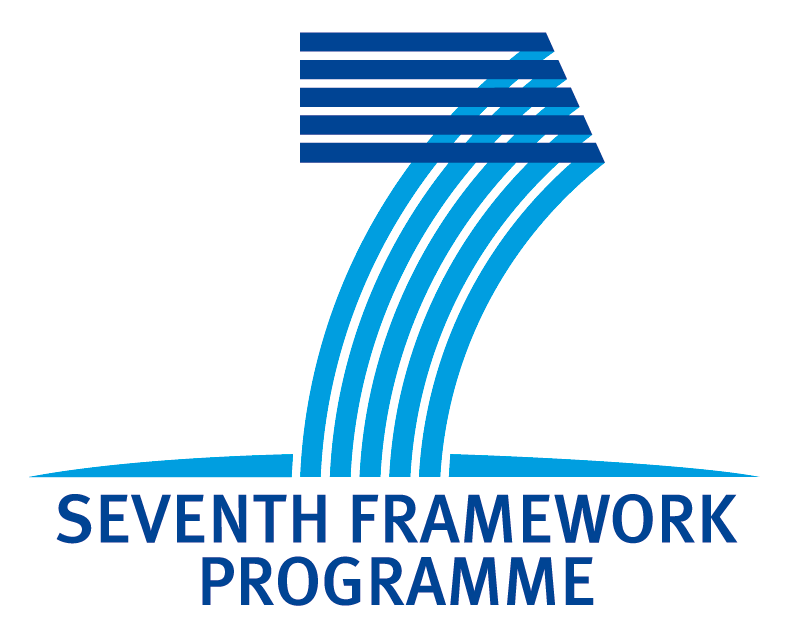

During the EA2011 conference in Rhodes, Greece, the European Commission chaired a session with focus on aquaculture related research projects funded under the 7th Framework Programme for Research and Technological Development (FP7). The aim of the session was to present and valorise results of EU and national projects in the field of aquaculture as well as facilitating the use of research infrastructures etc. The achievements of the PRO-EEL project were presented by the project coordinator Jonna Tomkiewicz in the presentation "Reproduction of European eel: Towards a self-sustained aquaculture (PRO-EEL)". Use this link to see the programme.
PRO-EEL presentations and posters during the AE2011 conference
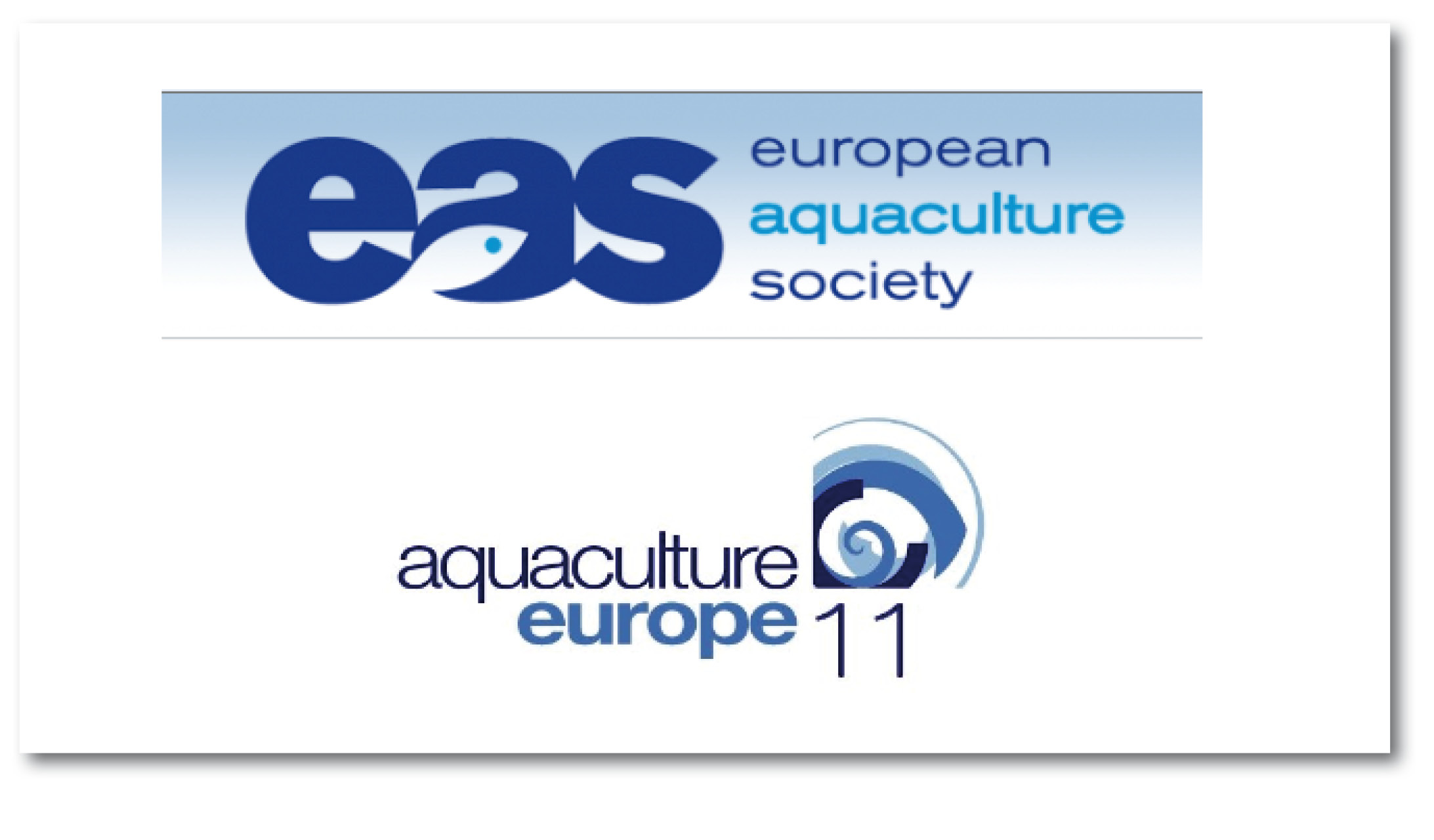
First results and achievements from different Workpackages were presented by the PRO-EEL consortium at theEuropean Aquaculture Conference EA2011, 18-21 October, Rhodes, Greece, including the following contributions:
Tomkiewicz, J. Reproduction of European eel: Towards a self-sustained aquaculture (PRO-EEL). Oral presentation.
Mazzeo, I., Baeza, R., Gallego, V., Vilchez, M.C., Pérez, L., Asturiano, J.F., 2011. Study of thermal regime effect on fatty acid mobilization in European eel (Anguilla anguilla, L.) females during induced sexual maturation. Oral presentation
Peñaranda, D.S., Herranz, V.G., Gallego, V., Mazzeo, I., Carneiro, P.C., Dirks, R.P., van den Thillart, G.E.E.J.M., Pérez, L., Asturiano, J.F., 2011. Gene expression regulation of steroidogenic enzymes in European eel (Anguilla anguilla, L.) males during induced sexual maturation under three thermal regimes, and relationship with sperm quality parameters. Poster presentation.
Corraze, G., Stoettrup, JG, Holst, L.K., Larroquet, L., Jacobsen, C, Tybjerg, L., Kaushik, S., and Tomkiewicz, J. Modulation of stored lipid reserves through broodstock nutrition and reproductive success in European eel (Anguilla anguilla). Poster presentation.
First PRO-EEL eel larvae successfully produced in full scale experiments
The PRO-EEL project experienced a productive and fruitful first year. The Consortium successfully integrated into a focused research group and the first series of joined experiments resulted in good batches of larvae living up 18 days post hatch.
Full scale experiments to reproduce eels and obtain viable offspring form the backbone of the PRO-EEL project, supplemented by small scale trials and laboratory analysis by partners studying various biological mechanisms. The scheduled first experimental series included experiments with broodstock eels originating from commercial eel farming. The second series used wild silver eels as female broodstock to benchmark the quality of the farmed broodstock. The aim is to use farmed broodstocks in the production of larvae for a self-sustained aquaculture of European eel.
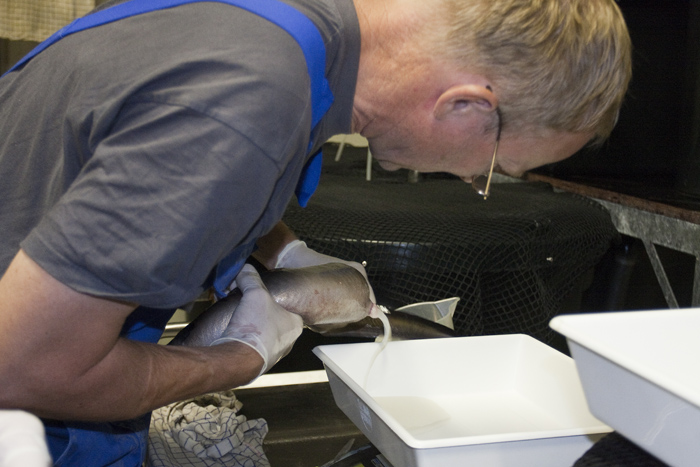
Farmed broodstock eels: Researchers with different expertise provided methods for application in the first experimental series. This series started in June 2010 by hormonal treatment of female and male eels. In autumn 2010, we successfully harvested eggs and sperm, made fertilisations in vitro and cultured eggs and larvae, with the longest living larvae reaching an age of 13 days post hatch.
The project approach where a number of subject-specific research protocols are integrated into one single full scale experiment was an exciting and challenging experience. The experiments were successful and achieved good results as well as integrated project participants in a joined effort.
A vast number of samples for specific analysis were obtained from these experiments comprising 120 farmed female eels reared on three different broodstocks diets in order to enhance female nutritional status and thereby egg quality.
Sampling included filets and liver for nutritional and contamination studies; pituitaries and blood plasma for hormone profile and gene expression; liver and ovaries for analysis of development in relation to treatments, ect. In particular, the processes leading to ovulation and the fertilisation success are object for dedicated studies to improve the quality of stripped eggs.
Farmed male eels similarly receive hormonal treatment and they are timed to develop and produce sperm during the period where females are ripe. Also the stripped eggs, and embryos and larvae produced are sampled to study development. Eggs and larvae are used in rearing experiments to improve culture conditions and to test potential larval diets. Eggs from a single batch were furthermore transferred to a partner in Norway and successfully hatched in rearing experiments.
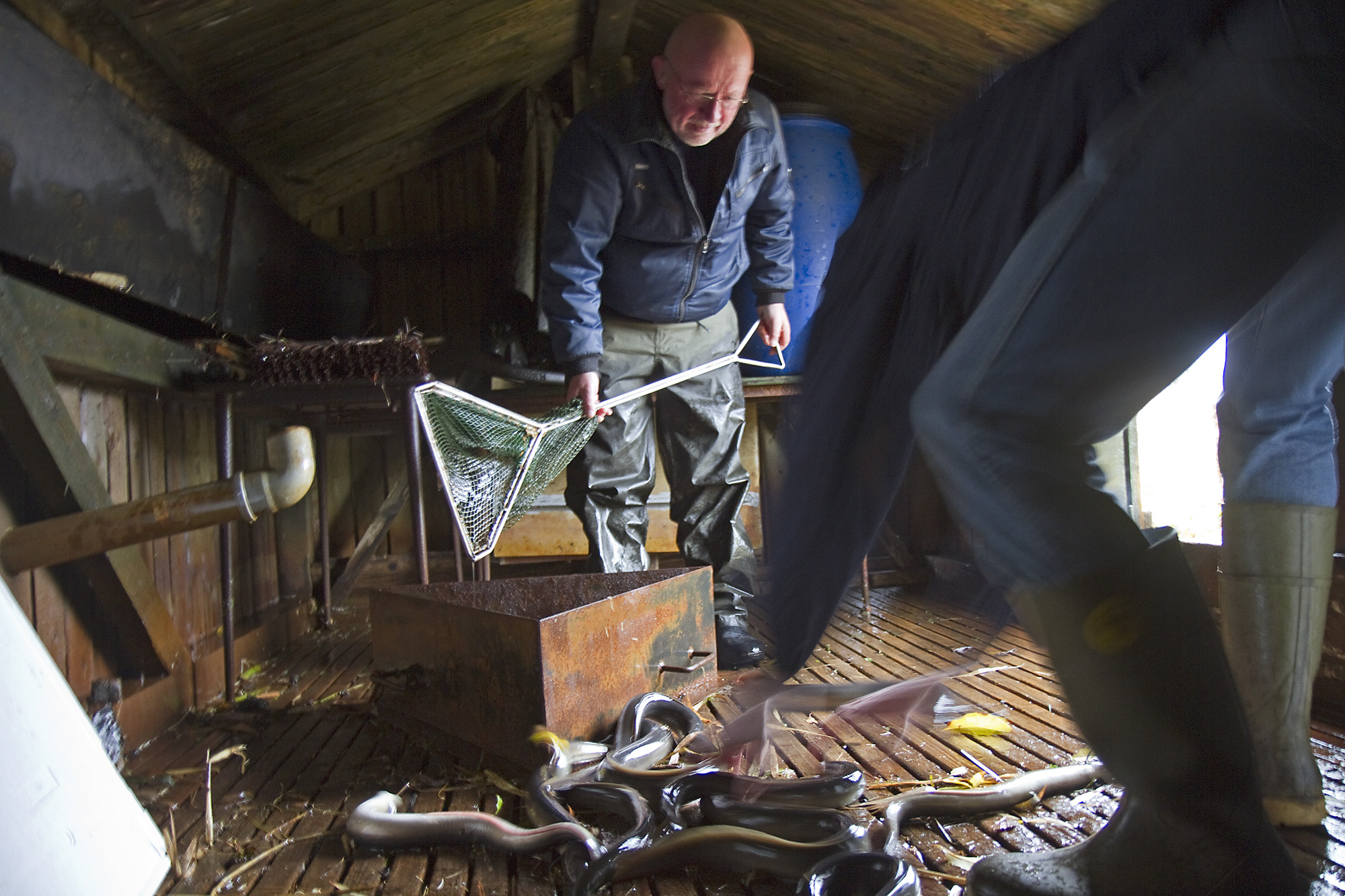
Wild caught broodstock : The second full scale experimental series focused on Nature’s own broodstock.
In autumn 2010, silver eels from a lake in Thy National Park in Jutland were caught in a traditional type of trap called an “Ålekiste” during the time of natural migration. The aim using the wild broodstock is to study the condition of the female silver eel and gain knowledge about the quality and composition of the eggs they produce. These features are applied in a comparative analysis to enhance the performance of domesticated European eel.
In total, 40 beautiful wild female eels were applied in the experiments and the egg production peaked in April and May 2011. These experiments produced many large egg batches, high fertilisation rates and good quality eggs and larvae. The longest living larvae reached an age of 18 days. These experiments enabled researchers possessing specific expertise within aquaculture research e.g. fish final egg maturation, fertilization procedures, egg quality criteria and culture conditions, to join the full scale experiments at the research facility in Denmark.
The joint experiments represent new and promising steps in the direction of establishing suitable rearing conditions and identify feed that is needed to increase survival and allow ongrowing of the larvae produced. The project partners participating in the joint experiment and other participants who conducted small scale experiments are now engaged in the analysis of samples and data. Further small scale and full scale experiments will be conducted in the coming years. The first PRO-EEL results are expected in autumn 2011 and will be presented at the Aquaculture Europe 2011 in Rhodes, Greece in October (EA2011).
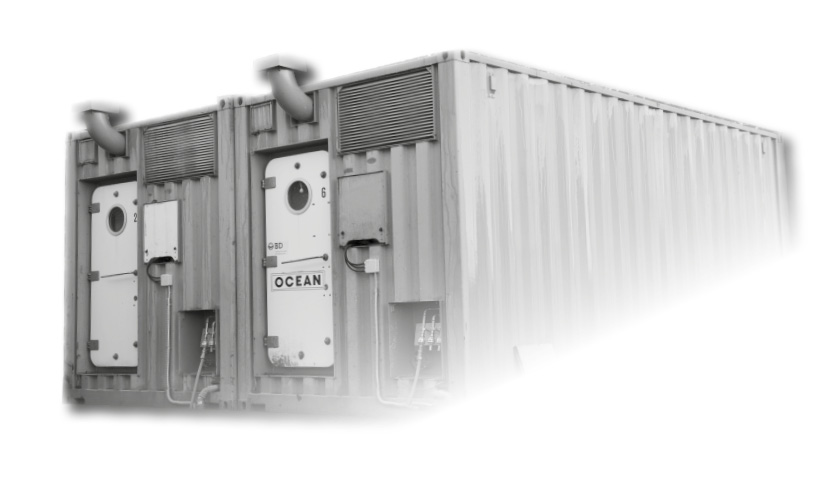 The Lyksvad research facility used for the joint experiments was upgraded in autumn 2011 with two laboratory containers. The Containers were provided by DTU Aqua for use in the project in order to improve the opportunities of researchers to visit and work at the facility. The containers were equipped and used during the Danish Galathea III Research Expedition (2006-2007). They feature basic laboratory facilities and offer calm quiet space for experiments and were ready for use in the first experimental period.
The Lyksvad research facility used for the joint experiments was upgraded in autumn 2011 with two laboratory containers. The Containers were provided by DTU Aqua for use in the project in order to improve the opportunities of researchers to visit and work at the facility. The containers were equipped and used during the Danish Galathea III Research Expedition (2006-2007). They feature basic laboratory facilities and offer calm quiet space for experiments and were ready for use in the first experimental period.
For the second series of experiments a new broodstock container was provided for culture of wild broodstock eels. The purpose is to keep wild and farmed eels at the same location, but separated thereby minimising the risk of transfer of diseases and parasites between wild and farmed broodstocks.